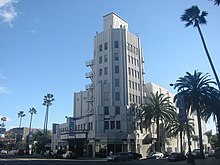Saban Theatre

Saban Theatre, 2006
|
|
| Former names |
|
|---|---|
| Address | 8440 Wilshire Boulevard Beverly Hills, California United States |
| Owner | Temple of the Arts |
| Current use | Live entertainment venue |
| Construction | |
| Opened | September 19, 1930 |
| Reopened | 1981 |
| Architect | S. Charles Lee |
| Website | |
|
Fox Wilshire Theatre
|
|
| Coordinates | 34°3′53″N 118°22′30″W / 34.06472°N 118.37500°WCoordinates: 34°3′53″N 118°22′30″W / 34.06472°N 118.37500°W |
| Area | 0.6 acres (0.24 ha) |
| Architectural style | Art Deco |
| NRHP Reference # | 12000164 |
| Added to NRHP | April 3, 2012 |
The Saban Theatre (pronunciation: /səˈbɑːn/ sə-BAHN) is a historic theatre in Beverly Hills, California, formerly known as the Fox Wilshire Theater. It is an Art Deco structure at the southeast corner of Wilshire Boulevard and Hamilton Drive designed by architect S. Charles Lee and is considered a classic Los Angeles landmark. The building was listed on the National Register of Historic Places on April 3, 2012.
Located on Wilshire Boulevard, the exterior of the building with its simple Art Deco ornamentation is one of the first buildings seen by pedestrians and drivers entering the eastern boundary of the city of Beverly Hills.
The Saban Theatre has been both a significant cultural and architectural landmark for Los Angeles and Beverly Hills since its opening as the Fox Wilshire Theatre on September 19, 1930. It was originally designed with 2500 seats by noted theatre architect S. Charles Lee to be a major film presentation house, even including a stage for Vaudeville acts before the films.
Over its 85-year history, the Saban has been the site of numerous film premieres, exclusive first-run film engagements, live concerts and touring Broadway shows. Despite several renovations, the interior remains mostly intact with its columned two-story rotunda lobby, spacious orchestra and balcony level seating for 2,000, and its silver, gold and black proscenium and organ screens. The connection with architect S. Charles Lee, a long-time resident of the city of Beverly Hills, makes the Saban significant also as an example of Lee’s transition from the French Regency style of the Tower Theatre and other Los Angeles Theatres to the nascent Art Deco style that would come to dominate movie palace architecture in the 1930s.
...
Wikipedia
